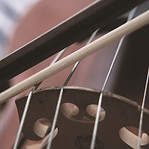
Singing Lessons
Who can take singing lessons?
We offer voice lessons to students of all ages and levels, ranging from young beginner students (5 yrs old) to adult voice students. Private voice lessons are customized to the individual needs and preferences of the students. The curriculum differs from student to student and it considers age, developmental stage, previous experience, and goals. We also offer adaptive voice lessons, taught by board-certified music therapists!
What are adaptive voice lessons?
Adaptive voice lessons are offered to students with mental health needs and/or developmental and learning disabilities. Although instrumental private music lessons are customizable in nature, adaptive music lessons take into consideration the student's health diagnosis. Adaptive lessons are led by a music therapist with a background in psychology and neuroscience. During adaptive voice lessons, the music therapist considers each student's unique set of skills and limitations and determines what accommodations will be needed for the student to succeed. The music therapist takes a creative approach to overcome challenges with the student. Examples of accommodations made during adaptive lessons might include: using multimodal means of learning (kinesthetic, visual, aural), enlarging sheet music for students with vision impairment, modifying the pacing of the lessons to allow the student enough time to succeed, arranging sheet music, etc.
If you're wondering whether your child or you would benefit from adaptive voice lessons, read more on our music therapy page
What teaching methods do we use?
Our teachers are familiar with a variety of pedagogical methods that take into account each student's learning style and potential. We want the learning experience to be rewarding and fruitful. Our teaching style is child-centered, meaning that our teachers are willing to work around the student's musical goals and objectives. The students have a sense of agency in their own learning, which empowers them and allows them to build positive experiences with music and to become successful musicians. Additionally, our teachers have an eclectic teaching style, meaning that they borrow the best aspects from a variety of methods, as opposed to blindly following a single method with all of its flaws.
Needless to say, we take a hands-on approach to teaching music (because what better way is there to do it?!) This means the teacher models the technique and sound they want the student to attain and the student gets to try it out and make modifications during the lesson. The teacher provides verbal feedback, but we believe in the importance of making music to learn music!
What will I/my child learn during a singing lesson?
When singing, the student's body becomes their instrument! For this reason, our teachers place an emphasis on vocal health. Because the student's health has a direct effect on their sound, our teachers use their understanding of the anatomy associated with singing (such as the vocal box and diaphragm) to ensure that the students can produce a beautiful, yet healthy, sound. Our vocal teachers also provide non-musical advice regarding vocal health, such as what foods and drinks to avoid before a performance, how much water to drink, when to have vocal rest, etc. Believe it or not, these non-musical elements have an effect on the vocal sound!
Furthermore, during the vocal lesson, the students and teacher work on breath support, tone quality, diction, posture, intonation, and more. A lesson goal might be to switch between chest voice and head voice, and knowing when it is necessary to do so. Additionally, each lesson covers a variety of musical elements, such as note-reading, sight-reading, rhythm training, vocal technique, music theory, music history, and performance readiness.
Vocal lessons usually start with vocal warm-ups. These are very important and we encourage students to do them at home. In addition, the students will sing through a variety of musical styles, such as classical, pop, and musical theater. The vocal lesson goes beyond the musical components and considers the facial expressions, body movements, and emotions of the character the students are enacting.
Our students perform a variety of musical compositions ranging from the classical style (Bach, Faure, Bellini, Puccini, etc.) to pop (Ariana Grande, Bruno Mars, Harry Styles, Lady Gaga, etc.) and some of their favorite musicals (Annie, The Wizard of Oz, Mary Poppins, The Lion King, The Phantom of the Opera, Wicked, etc.)







